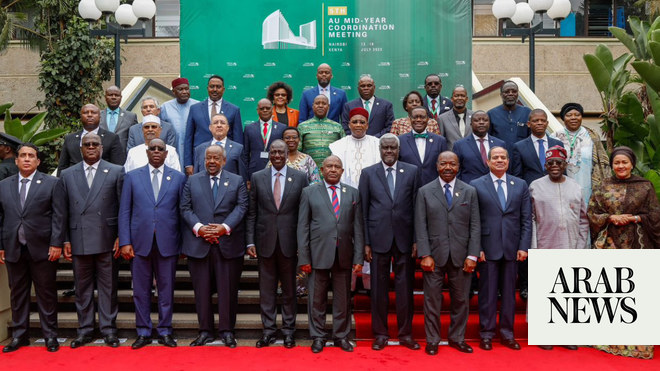
Egypt’s presidential elections concluded with the predicted outcome — President Abdel Fattah El-Sisi sweeping to a second four-year term in office. Official results show that more than 24 million Egyptians went to the polls and 97 percent of them voted for El-Sisi. A great deal of controversy surrounded the elections and the absence of genuine competitors, but the elections are now over and the most pressing question is: What is on the president’s agenda for the next four years?
The challenges facing him seem difficult and intertwined — whether relating to internal or external affairs.
The war on terror might be the most obvious challenge. During El-Sisi’s first term as president, Egypt managed to corner extremism in Sinai and, according to observers and analysts, achieved a lot in terms of combatting terrorism. However, Egypt continues to experience attacks, so tackling terror is among the most important and urgent files on El-Sisi’s agenda. The people of Egypt believe that defeating extremists is the key step on the path to stability — not only in terms of security, but also economically and politically.
There is a need to develop new security models, employ the latest equipment, and increase citizens’ awareness of the matter. Without an alliance between citizens and the state in the war on terror, the challenge will be more difficult.
The completion of large national projects is also a concern. El-Sisi successfully launched several national projects, some of which raised controversy, during his first term. Perhaps the most important of these ambitious projects is the Suez Canal Area Development Project, which, if it succeeds, will change the face of Egypt’s economy.
Other important projects, including housing, roads, transport and infrastructure, as well as building a new administrative capital, continue to attract significant investment.
El-Sisi must explain what his priorities are and, most importantly, what the outcomes of the state’s projects will be. This will help the people understand how he will affect their lives and therefore be convinced to support the state in overcoming tough situations. The public must be able to understand and accept the difficult measures they may undergo while the economic situation is addressed.
There is no doubt that the Egyptian economy has improved in the past four years. The trade deficit dropped by 25 percent in 2017 compared to the previous year, commodities exports rose by 11 percent to reach $5.8 billion, and remittances from Egyptians working abroad reached roughly $6 billion in July last year. Nevertheless, these rates are far from the target that will drive the economy forward and improve people’s lives. In fact, these rates are considered a decline when compared to those before the events of Jan. 25, 2011.
The president is tackling a number of significant challenges that previous leaders and governments failed to approach. But if El-Sisi and his team managed to turn their economic objectives into reality, this would be a great achievement that would reflect positively on Egypt and make it once again very attractive for international investments, after having been neglected in recent years.
Challenges facing El-Sisi during his second term as Egypt"s president are difficult and intertwined.
Abdellatif El-Menawy
Foreign policy matters that El-Sisi will have to handle are also important, as success would reflect positively on the country’s internal situation in terms of stability and its economy. In the past four years, El-Sisi managed to diversify his political and economic partners, making several visits to countries whose relations with Egypt have been cold since 2011, including the US and France.
Remarkable progress has been seen in the cooperation between Egyptian and US forces, and this has been noted by US President Donald Trump. Moreover, Egypt’s arms deals with France and Russia are among El-Sisi’s biggest achievements, in addition to the country’s current strong relations with the UAE and Saudi Arabia.
El-Sisi’s continuation in office will motivate international financial institutions that have largely cooperated with his economic program — especially the International Monetary Fund, the World Bank, the African Bank, and the European Bank — to continue to do so during his second term. This will ensure continuous foreign inflows and direct investment in the Egyptian market.
Egypt’s relationship with international human rights organizations continues to be somewhat tense, and this is a matter El-Sisi must address by creating more communication channels, or by clarifying what those organizations refer to as “violations of human rights.” If he fails to deal with this challenge in a positive manner, it will remain a major obstacle to improving Egypt’s foreign relations.
Meanwhile, the Grand Ethiopian Renaissance Dam and Egypt’s relationship with Ethiopia continue to be a pressing foreign affairs challenge for El-Sisi. This issue may enter a more complex phase during his second term, so it must be tackled in a more assertive manner, especially when Sudan has encouraged Ethiopia to procrastinate.
Some believe El-Sisi has tackled the Renaissance Dam challenge with wisdom and reason, taking into account the strong relations between Egypt and its neighbors. This was evident in his keenness to highlight the strength of the historic and economic partnerships between the countries of Africa. However, the result so far is that the Renaissance Dam and Egyptian-Ethiopian relations continue to be thorny issues, and the challenge here lies in how to improve this relationship without undermining the rights of the Egyptian people. This requires a direction different to the one adopted during El-Sisi’s first term.
Abdellatif El-Menawy is a critically acclaimed multimedia journalist, writer and columnist who has covered war zones and conflicts worldwide. Twitter: @ALMenawy











